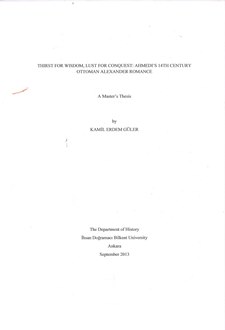Thirst for wisdom, lust for conquest : Ahmedi's 14th century Ottoman Alexander romance / Kamil Erdem Güler ; [supervisor Evgenia Kermeli].
Yer Numarası
B.I/7480
Dil Kodu
İngilizce
Yazar
Yayın Bilgisi
2013.
Tez Notu
Tez (Yüksek Lisans) -- İhsan Doğramacı Bilkent Üniversitesi Ekonomi ve Sosyal Bilimler Enstitüsü Tarih Ana Bilim Dalı, 2013.
Bibliyografi, vb. Notu
Bibliyografya y. 114-121.
Özet, vb.
► Bu çalışma Ahmedi'nin 14. yüzyılda yazmış olduğu İskendername adlı eserinden yola çıkarak dönemin düşünsel paradigmasını analiz etmektedir. Bu kapsamda analiz edilen zaman dilimi Osmanlı entelektüel kültürünün siyasi gelişmelere bağlı olarak geliştiği 14. yüzyıldır. Ahmedi'nin yazmış olduğu İskendername'nin içinde yer alan Osmanlı tarihi bölümü Osmanlı tarihçileri tarafından incelenmiştir ancak bu çalışmada Anadolu'da ortaya çıkan 14. yüzyılın düşünsel paradigmasını kavrayabilmek için İskendername'nin tamamı incelenmiştir. Bu sebeple ilk olarak düşünce tarihinin önemi belirtilmiş ve Ahmedi ve Ahmedi'nin eseri hakkında gerçekleştirilen çalışmalar incelenmiştir. Ahmedi'nin ait olduğu zaman dilimi ve Ahmedi'nin patronlarıyla ilişkileri analiz edilmiştir. 14. yüzyılın özellikleri Ahmedi'yi ve zamanının problemlerine düşünsel yaklaşımlarını şekillendirmiştir. Bunun yanında, Büyük İskender romanlarını bir tür olarak ve evrensel destanlar olarak inceledik. Büyük İskender'in evrensel şahsiyeti farklı kültürler tarafından kullanılmış ve her toplum Osmanlıların İskendername'ye yaptıklarına benzer olarak destanlarına kültürel temalarını eklemişlerdir. Ahmedi'nin siyasi kurgu romanı oluşmakta olan Osmanlı siyasi kurumlarına entelektüel ve ideolojik bir temel oluşturmuştur. Son olarak, dönemin diğer şairlerinden Şeyhi ve Şeyhoğlu ile karşılaştırmalar yapılarak dönemin düşünce yaklaşımını anlamaya çalıştık. Osmanlı entelektüel yaşamı İmam Gazali'nin ortodoks öğretilerinin ve Sufi öğretilerin birleşiminden şekillenmiştir. Böylelikle, bahsi geçen düşünce temaları bilgi, varlık, melankoli ve estetik bağlamında incelenmiştir.
► This study presents an analysis on the intellectual paradigm of the 14th Century Anatolia based on Ahmedi's Ottoman Turkish Alexander Romance, Iskendername. The time frame that we would like to focus on is the late 14th century, the period of the emergence of the intellectual culture correlated with the political developments of the Ottoman State. Ahmedi's History of Ottoman Empire, which is a part in Iskendername, was analyzed by historians of the Ottoman Empire but in this study we analyzed the complete work in order to comprehend the main intellectual tendencies of the 14th Century Anatolia. Therefore, primarily the gravity of the intellectual history along with social and economic history was expressed and we presented studies on Ahmedi and Ahmedi's Iskendername. The historical process that Ahmedi bonded is analyzed and by that the relation between Ahmedi and his patrons were examined. The features of the 14th Century shaped Ahmedi and his intellectual approach on the questions of his time. Moreover, we inquired Alexander Romances, as a literary genre and as universal epics. We also argue that universal character of Alexander the Great was utilized by different cultures and each society implemented their own cultural themes as Ottomans did with Iskendername. The political fiction of Ahmedi served as an intellectual and ideological implementation of the emerging Ottoman political institutions. Finally, the other poets of the time, Şeyhi and Şeyhoğlu were examined in comparison to understand the intellectual inclinations. It is argued that the main patterns of the Ottoman intellectual life were shaped by the amalgamation of the orthodox doctrines of Imam Gazali and Sufism. Hence, these intellectual themes were examined with the notion of knowledge, existence, melancholy and aesthetics.
► This study presents an analysis on the intellectual paradigm of the 14th Century Anatolia based on Ahmedi's Ottoman Turkish Alexander Romance, Iskendername. The time frame that we would like to focus on is the late 14th century, the period of the emergence of the intellectual culture correlated with the political developments of the Ottoman State. Ahmedi's History of Ottoman Empire, which is a part in Iskendername, was analyzed by historians of the Ottoman Empire but in this study we analyzed the complete work in order to comprehend the main intellectual tendencies of the 14th Century Anatolia. Therefore, primarily the gravity of the intellectual history along with social and economic history was expressed and we presented studies on Ahmedi and Ahmedi's Iskendername. The historical process that Ahmedi bonded is analyzed and by that the relation between Ahmedi and his patrons were examined. The features of the 14th Century shaped Ahmedi and his intellectual approach on the questions of his time. Moreover, we inquired Alexander Romances, as a literary genre and as universal epics. We also argue that universal character of Alexander the Great was utilized by different cultures and each society implemented their own cultural themes as Ottomans did with Iskendername. The political fiction of Ahmedi served as an intellectual and ideological implementation of the emerging Ottoman political institutions. Finally, the other poets of the time, Şeyhi and Şeyhoğlu were examined in comparison to understand the intellectual inclinations. It is argued that the main patterns of the Ottoman intellectual life were shaped by the amalgamation of the orthodox doctrines of Imam Gazali and Sufism. Hence, these intellectual themes were examined with the notion of knowledge, existence, melancholy and aesthetics.
Dil Notu
İngilizce özet y. iii-iv.
Türkçe özet y. v-vi.
Türkçe özet y. v-vi.
Konu
Emeği Geçenler
Ünal, Evgenia Kermeli, Dr., tez danışmanı.


